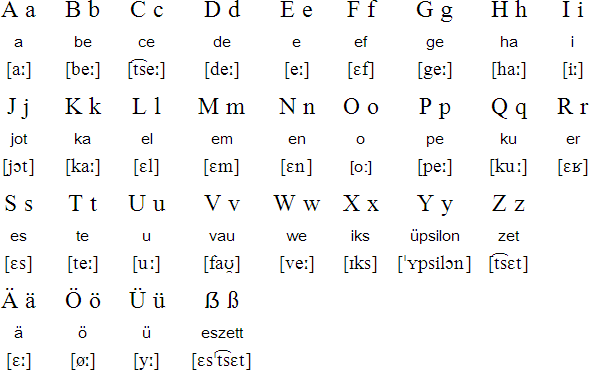Almanca / Deutsch
The lesson notes I have taken to learn the German language beginning from A1. I decided to create this git repository to regularly improve, remember and read them again in the future.
das Alphabet
List of basic terms of Grammar
| Term | Definition in English |
|---|---|
| -s Adjektiv Adjective Sıfat |
A word or phrase naming an attribute, added to or grammatically related to a noun to modify or describe it. |
| -s Adjektivklausel Adjective clause Sıfat tamlaması |
An adjective clause is simply a group of words with a subject and a verb that provide a description. The clause starts with a relative pronoun such as who, whom, whose, that, or which or a relative adverb such as when, where and why. |
| -s Dativobjeckt Indirect object Dolaylı nesne |
A noun phrase referring to someone or something that is affected by the action of a transitive verb (typically as a recipient), but is not the primary object (e.g., him in give him the book). |
| -s Hilfsverb Auxiliary verb Yardımcı Fiil |
A verb used in forming the tenses, moods, and voices of other verbs. |
| -s Idiom Idiom Deyim |
Idiom is a phrase or an expression that has a figurative, or sometimes literal, meaning. Categorized as formulaic language, an idiom's figurative meaning is different from the literal meaning. There are thousands of idioms, occurring frequently in all languages. |
| -e Konjunktion Conjunction Bağlaç |
Word used to connect clauses or sentences or to coordinate words in the same clause (e.g. and, but, if) |
| -e Konjugation Conjugation Fiil çekimi |
The variation of the form of a verb in an inflected language such as Latin, by which are identified the voice, mood, tense, number, and person. |
| -e Nominalphrase Noun phrase İsim tamlaması |
A word or group of words that functions in a sentence as subject, object, or prepositional object. |
| -s Objekt Object Nesne |
|
| -e Präposition Preposition Edat |
A preposition is a word such as after, in, to, on, and with. Prepositions are usually used in front of nouns or pronouns and they show the relationship between the noun or pronoun and other words in a sentence. |
| -e Präpositionalphrase Prepositional phrase Tamlama |
Every prepositional phrase is a series of words made up of a preposition and its object. The object may be a noun, pronoun, gerund or clause. A prepositional phrase functions as an adjective or adverb. |
| -s Pronomen Pronouns Zamirler |
A word that can function as a noun phrase used by itself and that refers either to the participants in the discourse (e.g. I, you) or to someone or something mentioned elsewhere in the discourse (e.g. she, it, this). |
| -s Personenpronomen Personal Pronouns Kişi zamirleri |
A personal pronoun is a pronoun that is associated primarily with a particular person, in the grammatical sense. The word “He” is an example of a personal pronoun. He is third person (because he is the person being spoken about), singular, and masculine. “We” is another example. |
| -s Prädikat Predicate Yüklem |
The part of a sentence or clause containing a verb and stating something about the subject (e.g., went home in John went home). |
| -s Subjekt Subject Özne |
The subject of a sentence is the person, place, thing, or idea that is doing or being something. You can find the subject of a sentence if you can find the verb. Ask the question, "Who or what 'verbs' or 'verbed'?" and the answer to that question is the subject. |
| -s Substantiv Noun İsim |
A word (other than a pronoun) used to identify any of a class of people, places, or things, or to name a particular one of these (proper noun). |
| -s Verb Verb Fiil |
A word used to describe an action, state, or occurrence, and forming the main part of the predicate of a sentence, such as hear, become, happen. |
| -r Zwischenruf Interjection Ünlem |
In linguistics, an interjection is a word or expression that occurs as an utterance on its own and expresses a spontaneous feeling or reaction. |
More good resources
Contribute
- Are you also interested with the language? Any kind of PR's are welcome!
- Have you found a problem and want to report it? Please create a new issue and describe the problem in German, English or Turkish.
